
The following buildings are located on Middlebury College's campus in the Champlain Valley in Vermont, United States. [1]

The following buildings are located on Middlebury College's campus in the Champlain Valley in Vermont, United States. [1]
| Image | Name | Year built/opened | Description |
|---|---|---|---|
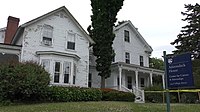 | Adirondack House | Remodeled in 1909 after being obtained by the college. [2] Formerly housed the Center for Careers and Internships (CCI). During the COVID-19 pandemic, ADK was transformed into isolation housing for infected students, and is now a dormitory for upperclassmen. It also houses Coltrane Lounge, which is used as an event space, as well as the student-run college bike shop in the basement. | |
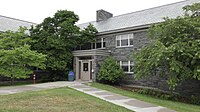 | Allen Hall | 1963 [2] | 1st-year residence hall [2] |
 | Alumni Stadium | ||
 | Atwater Hall A | 2004 [3] | Suite housing for upperclassmen [3] and a popular party space. [4] [5] The Atwater dorms are often referred to as "fratwater" and Atwater is used as a metonym for the party scene at Middlebury. [6] |
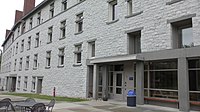 | Atwater Hall B | 2004 [7] | Suite housing for upperclassmen [7] and a popular party space. [4] [5] The Atwater dorms are often referred to as "fratwater," and Atwater is used as a metonym for the party scene at Middlebury. [6] |
 | Atwater Dining Hall | 2005 [8] | Formerly open for breakfast, lunch, and special events. As an attempt to curb the spread of COVID-19, Atwater is now open for 3 meals a day during the week, and closed during the weekends. |
 | Axinn Center At Starr Library | 2008 [9] | The Axinn Center is an adaptation of Starr Library, which was built in 1900 and expanded multiple times. Now houses classrooms and faculty offices in addition to the original library. [9] |
 | McCardell Bicentennial Hall | 1999 [2] | Science building; [2] home to an observatory with a 24-inch (0.61 m) optical telescope [10] and a greenhouse. Known colloquially as "BiHall," [11] [12] it is home to the largest window in the state and is popularly thought to be the second-largest building in Vermont by floor area. [13] [14] |
 | Battell Hall | 1950 and 1955 [2] | First year dormitories named for Joseph Battell. Originally built as two separate buildings, Battell North and Battell South, with the center connecting the two constructed in 1955. [2] |
 | Centeno House | Houses the Parton Center, the college's health center | |
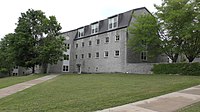 | Coffrin Hall | 1986 [2] | Primarily a dormitory for sophomores and a few first years [2] |
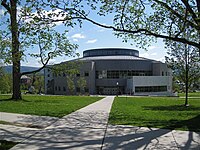 | Davis Family Library | 2004 [2] | Built on the site of the former Science Center [2] |
 | Franklin Environmental Center at Hillcrest | Houses environmental studies offices and classrooms in a LEED Platinum-certified building. [15] | |
 | Freeman International Center | 1970 [2] | A former dining hall, now houses classrooms, the offices for the German, Japanese, and Russian departments, and the Hillel Jewish Center [16] |
 | Gifford Hall | 1940 [2] | Sophomore Dormitory, also houses the Gamut Room performance space and outdoor "gampitheatre"as well as a seminar room. |
 | Hadley Hall | 1969 or 1970 [2] | Sophomore dormitory. On the right side of the image; Milliken Hall is on the left, and Ross Tower is in the middle |
 | Hathaway House | Houses the Charles P. Scott Center for Religious Life and the Chaplain's Office | |
 | Hepburn Hall | 1916 [2] | Dormitory, also houses the newsroom for the Middlebury Campus student newspaper in the basement and the Hepburn Zoo, a blackbox theatre, on the second floor. The Zoo, a former dining area, is so-named because it was originally adorned with the hunting trophies of A. Barton Hepburn '71 (1871), who gave the hall as a gift to the school. Hepburn Hall was also originally painted bright yellow but was repainted gray following Hepburn's death to better match the rest of the campus' buildings. [2] |
 | Johnson Memorial Building | 1968 [2] | Houses the architecture and studio art departments |
 | Kenyon Arena | 1998 [17] | Hockey arena with a seated capacity of 2,600 |
 | Kelly Hall | 1969 or 1970 [2] | Upperclassmen residence [18] |
 | Kirk Alumni Center | ||
 | LaForce Hall | 2004 [2] | Upperclassmen residence |
 | Lang Hall | 1969 or 1970 [2] | Upperclassmen residence |
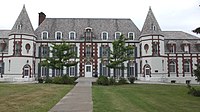 | Le Château | 1925 [2] | Home to the Department of French; also contains classrooms and student housing [2] |
 | Mahaney Arts Center | 1992 [2] | Also home to the Middlebury College Museum of Art, [2] the 370-seat Robison (concert) Hall, the 160-seat Dance Theatre, and 200-seat black box Seeler Studio Theatre [19] |
 | McCullough Student Center | 1912 [2] | Originally a gymnasium; converted into a student center after an expansion and remodel [2] |
 | Memorial Field House | 1949 [2] | Building is a former air base in New York. It was moved to Middlebury by truck and reassembled there. [2] |
 | Middlebury Chapel | 1916 [2] | Chapel for formal events; built in the style of a traditional New England meeting house combined with the marble of the American neoclassical style. Above the colonnade is a quote from Psalm 95, "The strength of the hills is His also." Also has an 11-bell carillon. [2] |
 | Milliken Hall | 1969 or 1970 [2] | Sophomore dormitory |
 | Munroe Hall | 1941 [2] | Houses classrooms as well as faculty offices for the political science, religion, sociology and anthropology, and economics departments |
 | Old Chapel | 1836 [2] | Administrative building [2] |
 | Painter Hall | 1816 [2] | The oldest Vermont college building still standing; used as a dormitory as of 2019. National fraternity Kappa Delta Rho was founded in Painter Hall in 1905. [2] |
 | Pearsons Hall | 1911 [2] | Sophomore dormitory |
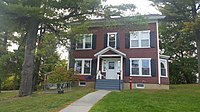 | Perkins House | Spanish house | |
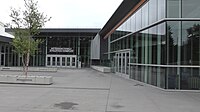 | Peterson Family Athletics Complex | ||
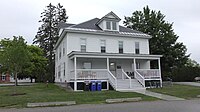 | Porter House | ||
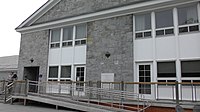 | Proctor Hall | 1960 [2] | Contains a dining hall and the college bookstore, as well as the recording studio for college radio station WRMC-FM. [2] |
 | Ridgeline Townhouses | 2016 [20] | Upperclassmen housing, newest buildings on campus. Became the subject of considerable controversy beginning in 2015 when the student body learned that the buildings would not be accessible to mobility-impaired and disabled students. [21] Over 467 students, or a fifth of the student body, signed a petition calling on administration to halt construction until the buildings could be redesigned to be accessible, but this did not happen and the Ridgeline Townhouses were built on schedule. [22] |
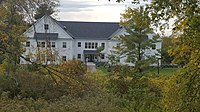 | Ridgeline View Suites | 2016 [20] | Upperclassmen housing, newest buildings on campus. Became the subject of considerable controversy beginning in 2015 when the student body learned that the buildings would not be accessible to mobility-impaired and disabled students. [21] Over 467 students, or a fifth of the student body, signed a petition calling on administration to halt construction until the buildings could be redesigned to be accessible, but this did not happen and the Ridgeline suites were built on schedule. [22] |
 | Robert A. Jones '59 House (RAJ) | Home to the Rohatyn Center for International Affairs (RCFIA) [23] | |
 | Ross Dining Hall | 2004 | |
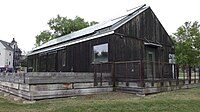 | Self Reliance | 2009 [24] | Middlebury College's first house built for the Solar Decathlon competition [24] |
 | Service Building and Biomass Gasification Plant | The $12 million biomass gasification plant, opened in 2009, boils and gasifies wood chips to provide steam heating and electricity to the college [25] | |
 | Starr Hall | 1860 [26] | Rebuilt in 1865 after a fire in 1864 [26] |
 | Stewart Hall | 1956 [2] | First Year Residence hall [2] |
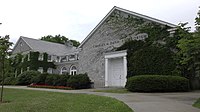 | Sunderland Language Center | 1965 [2] | Language classrooms and offices; also houses the 272 seat Dana Auditorium, used for lectures, movie screenings, and other events [19] |
 | Alexander Twilight Hall | 1867 [27] | Named for Alexander Twilight, the first African-American man to earn a degree from an American college or university. Colloquially known as "Twilight," it houses classrooms and the classics, philosophy, and education departments. [27] |
 | Virtue Field House | 2015 [28] | Contains a 200-meter indoor track [28] in a LEED Platinum-certified building. [29] |
 | Voter Hall | 1913 [2] | Houses faculty offices for the Arabic, Chinese, and Italian departments on the first floor and basement and upperclassmen housing on the upper floors as of 2019. Originally built as a chemistry building. [30] |
 | Warner Hall | 1901 [2] | Houses the economics and mathematics departments |
 | Wright Hall | Houses the 350-seat Wright Theatre [19] | |
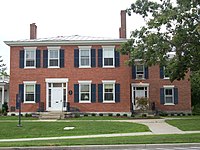 | Emma Willard House | 1811 [2] | Used as the college's admissions building. National historic site [2] |
 | Forest Hall | 1936 [2] | Dormitory, also houses a darkroom and Islamic prayer space in the basement. Name derived from the fact that its construction was financed by the 1915 sale of a forest to the Federal Government to create the Green Mountain National Forest. [2] |
| Natatorium | 1996 [2] | ||
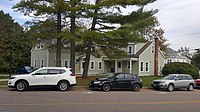 | 118 South Main Street | Houses the Center for Creativity, Innovation & Social Entrepreneurship (CCISE), also known as the "Innovation Hub" [31] | |
| 121A South Main Street | |||
 | 75 Franklin Street | Bread Loaf offices | |
 | Bowker Barn | Staff offices | |
| Brainerd Commons House | |||
 | Carr Hall | 1951 [32] | Houses the Anderson Freeman Center, a student center that works to promote a welcoming and inclusive environment for minority and first-generation students [32] |
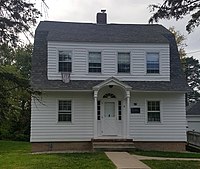 | Chellis House | Home to the gender studies department and the Women's and Gender Studies Resource Center | |
 | Farrell House | Faculty offices, used by the economics department as of 2019 | |
 | Hesselgrave House | Faculty offices | |
 | Kitchel House | 1867 [33] | Home to Middlebury's Center for Careers and Internships' [33] |
| Marble Works Offices | Houses finance, human resources, and business services departments in a building off the campus itself | ||
| Nichols House | |||
| Old Court House | In the town of Middlebury, off the campus itself | ||
| President's House | |||
 | Public Safety | ||
| Center for Community Engagement | |||
 | Wonnacott Commons House | ||
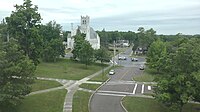 | 107 Shannon Street | Senior housing (house behind the church) | |
| 220 College Street | |||
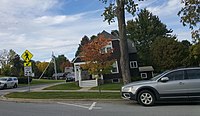 | 248 College Street | Senior housing | |
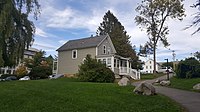 | 23 Adirondack View | Events staff offices | |
 | 33 Adirondack View | ||
| 48 South Street | A dormitory, formerly home to the Kappa Delta Rho fraternity/social house before it was shut down in 2015 due to a hazing violation [34] | ||
| 637 College Street | Russian house | ||
 | 70 Hillcrest Road | Home to the Queer Studies House (QSH, pronounced "kwish"), an academic interest house for students interested in queer studies, since 2008 [35] | |
 | 99 Adirondack View | ||
 | Bowker House | Xenia social house | |
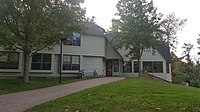 | Brackett House | 1997 [36] | Tavern social house |
 | Brooker House | 1997 [37] | Outdoor interest house and home to the school's Mountain Club |
| Chinese House | |||
 | French House | ||
| Hadley House and Barn | Used to host college guests [38] | ||
 | Hebrew House | ||
| Homer Harris House | |||
| Homestead House | |||
| InSite Solar Decathlon House | 2013 [39] | Middlebury's second house built for the Solar Decathlon; LEED Platinum certified [40] | |
 | Japanese House | ||
| Jewett House | Wellness House | ||
 | Longwell House | Italian house | |
 | Max Kade Center for German Studies at the Deanery | German house | |
| McKiney House | |||
 | Meeker House | Dormitory | |
| Munford House | Dormitory | ||
 | PALANA House | PALANA (Pan-African, Latino, Asian, and Native American) is the Intercultural Academic Interest House for students interested in diversity and intercultural issues | |
| Palmer House | 1997 [41] | ||
 | Portuguese House | ||
 | Prescott House | 1997 [42] | Chromatic social house, formerly home to Alpha Delta Phi fraternity/social house until its suspension in 2013. [43] |
 | Ross Tower | Dormitory. Ross Tower is on the left of the image, and Milliken Hall is on the right. | |
 | Sperry House | Arabic house | |
 | The Mill | Social house | |
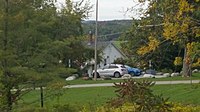 | Turner House | Senior housing | |
| Weybridge House | Food studies special interest house | ||
| David W. Ginevan Recycling Center |

Haverford College is a private liberal arts college in Haverford, Pennsylvania. It was founded as a men's college in 1833 by members of the Religious Society of Friends (Quakers). Haverford began accepting non-Quakers in 1849 and women in 1980.

Middlebury is the shire town of Addison County, Vermont, United States. As of the 2020 census, the population was 9,152. Middlebury is home to Middlebury College and the Henry Sheldon Museum of Vermont History.
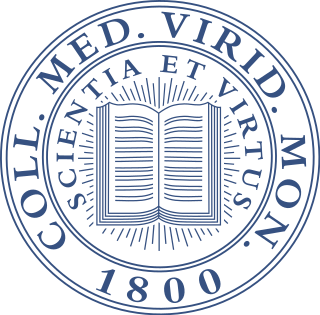
Middlebury College is a private liberal arts college in Middlebury, Vermont. Founded in 1800 by Congregationalists, Middlebury was the first operating college or university in Vermont.
John Malcolm McCardell Jr. is an American historian and academic administrator. He served as the President of Middlebury College from 1992 to 2004 and as the Vice-Chancellor and President of Sewanee: The University of the South from 2010 to 2020.
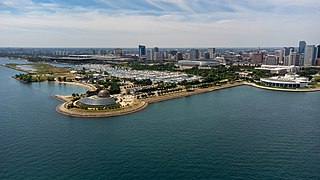
Museum Campus is a 57-acre (23 ha) park in Chicago facing Lake Michigan in Grant Park. It encompasses five of the city's major attractions: the Adler Planetarium, America's first planetarium; the Shedd Aquarium; the Field Museum of Natural History. It is adjacent to Soldier Field, home of the NFL Chicago Bears football team; and the Lakeside Center of McCormick Place and to Northerly Island park and Burnham Harbor.
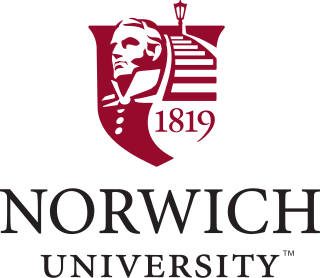
Norwich University – The Military College of Vermont is a private senior military college in Northfield, Vermont. It is the oldest private and senior military college in the United States and offers bachelor's and master's degrees on-campus and online. The university was founded in 1819 in Norwich, Vermont, as the American Literary, Scientific and Military Academy. It is the oldest of six senior military colleges and is recognized by the United States Department of Defense as the "Birthplace of ROTC".
The Community College of Vermont (CCV) is a public community college in Vermont. It is Vermont's second largest college, serving 7,000 students each semester and is part of the Vermont State Colleges System. The college has 12 locations throughout Vermont as well as extensive online learning options.

The Middlebury Panthers are the 31 varsity teams of Middlebury College that compete in the New England Small College Athletic Conference. The Panthers lead the NESCAC in total number of national championships, having won 42 team titles since the conference lifted its ban on NCAA play in 1994. Middlebury enjoys national success in soccer, cross country running, field hockey, men's basketball, women's hockey, skiing, men's lacrosse and women's lacrosse, and fields 31 varsity NCAA teams and several competitive club teams including a sailing team (MCSC), a crew team, a water polo team, an ultimate frisbee team, and a rugby team. Since 2000, Middlebury's varsity squads have won 84 NESCAC titles. Currently, 28% of students participate in varsity sports.
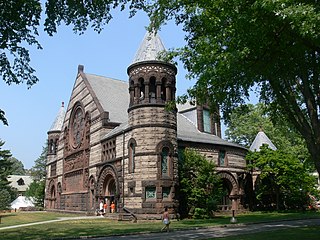
William Appleton Potter was an American architect who designed numerous buildings for Princeton University, as well as municipal offices and churches. He served as a Supervising Architect of the Treasury from 1874 to 1877.

The Robert Frost Farm, also known as the Homer Noble Farm, is a National Historic Landmark in Ripton, Vermont. It is a 150-acre (61 ha) farm property off Vermont Route 125 in the Green Mountains where American poet Robert Frost (1874-1963) lived and wrote in the summer and fall months from 1939 until his death in 1963. The property, historically called the Homer Noble Farm, includes a nineteenth-century farmhouse and a rustic wooden writing cabin. The property is now owned by Middlebury College. The grounds are open to the public during daylight hours.

Thaddeus Fairbanks was an American businessman, mechanic, and engineer. He invented furnaces, cooking stoves, cast iron steel plows, and other metal items related to farming. He invented and manufactured the first platform scale, the Fairbanks scale, that allowed the accurate weighing of large objects. His scales revolutionized farming and manufacturing and were sold worldwide, and he received numerous honors and awards for his development of the technology. Fairbanks was also a philanthropist, and was a co-founder of the St. Johnsbury Academy.
KieranTimberlake is an American architecture firm founded by Stephen Kieran and James Timberlake in Philadelphia. The firm espouses a philosophy of sustainable design, collaborative design, and in-depth research. They have also shown an interest in prefabrication, new technologies and integrating architecture with the actual activities to take place in the buildings they design, especially using "teaching" design elements in schools. Their interest in productions and craft led them to team up with DuPont to develop Smartwrap, a laminated polymer film that can support thin interstitial films, including photovoltaics, OLEDs, polarizing or UV screens, etc.

Albany College of Pharmacy and Health Sciences is a private, independent college with a campus in Albany, New York. ACPHS is home to approximately 1,400 students and 115 full-and-part time faculty. As of 2020, it was tied as the 59th-ranked pharmacy school in the US.

The History of Louisiana Tech University began when the Industrial Institute and College of Louisiana was founded in Ruston, Louisiana in 1894. The institute was founded to develop an industrial economy in the state of Louisiana. Four years later, the school was renamed the Louisiana Industrial Institute when Louisiana adopted the Constitution of 1898. When the Constitution of 1921 was passed, the school changed its name again to Louisiana Polytechnic Institute to reflect the school's evolution from a trade school into a larger and broader technical institute. Although the university was informally called Louisiana Tech for about five decades after the 1921 name change, it was not until 1970 when Louisiana Polytechnic Institute officially changed its name to Louisiana Tech University. Over the course of its history, the school grew from a small industrial institute with one building to a university with five colleges and an enrollment of around 11,800 students.

Smog is a public artwork by American artist Tony Smith located to the south east of McCardell Bicentennial Hall on the Middlebury College campus, in Middlebury, Vermont. An example of minimalist sculpture, the piece is a lattice of 45 octahedra, standing on 22 tetrahedra, and topped with 15 prisms. It is fabricated from aluminum, painted black. This work is first in an edition of three, with one artist's proof.

The Old Custom House is a historic government building in downtown Cairo, Illinois. Built from 1869 to 1872, the building served as a customs house, post office, and courthouse. Alfred B. Mullett, the U.S. Supervising Architect at the time, designed the building in the Italianate style, a rarity among federal buildings; his design features a bracketed cornice and rounded windows. When Cairo built a new post office in 1942, the building became the town's police station. The building is one of the few surviving U.S. custom houses and one of the largest federal buildings of its era in the Mid-Mississippi Valley region.

Woodrow Wilson Hall is an American building on the campus of James Madison University (JMU) located on the center of the university's quadrangle in Harrisonburg, Virginia. Dedicated on 15 May 1931, the building's namesake is President Woodrow Wilson, who was born in nearby Staunton.

Old Stone Row is a collection of three stone buildings flanking the original campus green of Middlebury College in Middlebury, Vermont. Painter Hall, built 1812-16, is the oldest surviving collegiate academic building in the state, with Old Chapel (1834–36) and Starr Hall (1865) as stylistic accompaniments, all based on vernacular mill construction styles of the period. The buildings and green were listed on the National Register of Historic Places in 1997.

Middlebury station is an Amtrak train station in Middlebury, Vermont. The station opened on July 29, 2022 when the Ethan Allen Express was extended from Rutland to Burlington.
![]() Media related to Buildings of Middlebury College at Wikimedia Commons
Media related to Buildings of Middlebury College at Wikimedia Commons